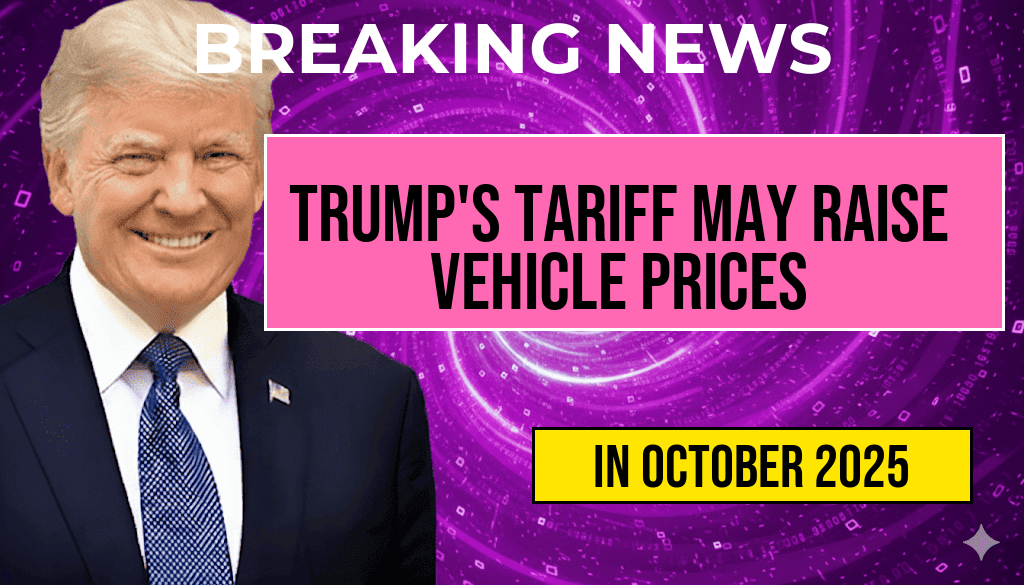As the automotive industry braces for potential changes under the Trump administration’s proposed tariff on imported vehicles, new reports indicate that car buyers could face increased costs of up to $5,286 per vehicle. This alarming figure, released by the American International Automobile Dealers Association (AIADA), has raised concerns among consumers already grappling with rising vehicle prices. The proposed tariffs, aimed primarily at imported cars and parts, could create significant ripples not only in the automotive market but also in the broader economy. With car sales slowing and interest rates rising, the timing of these tariffs has sparked a fierce debate about their potential impact on American consumers and the auto industry as a whole.
The Proposed Tariff and Its Implications
President Trump’s administration has signaled a renewed focus on protecting domestic manufacturing through punitive tariffs on foreign-made vehicles. The rationale behind this move is to bolster American automakers and safeguard jobs, particularly in manufacturing sectors. However, the AIADA’s analysis suggests that the financial burden of such tariffs would likely fall on consumers, particularly those looking to purchase new vehicles.
How Tariffs Could Affect Prices
According to the AIADA, the proposed tariff could lead to an average increase in vehicle prices of $5,286. This increase would be primarily due to higher costs for components and manufacturing processes that rely on imported parts. The following factors contribute to the expected price hikes:
- Increased Production Costs: Tariffs on imported auto parts could drive up manufacturing expenses, which automakers may pass on to consumers.
- Supply Chain Disruptions: The automotive industry relies heavily on a global supply chain. Tariffs could disrupt this, resulting in shortages and further price increases.
- Market Dynamics: As prices rise, demand may decrease, leading to a potential slowdown in vehicle sales and a negative impact on the overall economy.
Consumer Response and Market Trends
Consumer reactions to the proposed tariffs have been mixed, with many expressing concern over the potential for inflated prices. A recent survey conducted by the AIADA found that 68% of respondents were worried about how tariffs would affect their ability to purchase a new vehicle. Additionally, the survey highlighted that 77% of consumers believe that tariffs would lead to fewer choices in the market.
Impact on Automakers
The potential increase in vehicle prices could also have significant implications for automakers. Many manufacturers, including major players like Ford and General Motors, have voiced their concerns about the impact of tariffs on their production costs and competitiveness. Some key points include:
- Investment Decisions: Uncertainty surrounding tariffs may lead automakers to rethink their investment strategies in the U.S., potentially stalling new manufacturing projects.
- Job Security: If vehicle prices rise and sales decline, job security for workers in the automotive industry could be jeopardized.
- Global Competitiveness: U.S. automakers may find themselves at a disadvantage compared to foreign competitors who are not subject to the same tariff structures.
Looking Ahead
As discussions around the proposed tariffs continue, automotive industry experts urge consumers and policymakers to consider the broader implications of such measures. With vehicle prices already on the rise due to inflation and supply chain challenges, the addition of tariffs could exacerbate the situation, leading to a decrease in car sales and a potential economic downturn. The AIADA’s report serves as a critical reminder of the interconnectedness of global trade and the domestic economy, highlighting the need for careful consideration in tariff policymaking.
Conclusion
While the intention behind the proposed tariffs may be to protect American manufacturing, the potential consequences for car buyers and the automotive industry could be severe. As prices are expected to rise significantly, consumers may need to adjust their purchasing plans, and manufacturers may face tough choices that could impact jobs and investment. As the situation unfolds, stakeholders across the automotive sector will be closely monitoring developments to assess the long-term ramifications of these tariff proposals.
For further information on the implications of tariffs on the automotive industry, visit Forbes or Wikipedia.
Frequently Asked Questions
What is the potential impact of Trump’s tariff threat on vehicle prices?
The tariff threat from Trump could lead to an increase in vehicle prices by as much as $5,286, significantly affecting new car buyers.
Why are vehicle prices expected to rise due to tariffs?
Tariffs on imported goods, including auto parts, can raise the overall production costs for manufacturers, leading to higher prices for consumers purchasing new vehicles.
Who will be most affected by the increase in vehicle prices?
New car buyers will likely feel the most impact, as the increased costs from tariffs will be passed along to them, making vehicles less affordable.
How do tariffs influence the automotive industry?
Tariffs can disrupt supply chains and increase costs for manufacturers, which in turn can lead to fewer options and higher prices for consumers in the automotive market.
What actions can consumers take in response to rising vehicle prices?
Consumers may consider waiting to purchase a new vehicle until prices stabilize, exploring used car options, or seeking financing alternatives to mitigate the impact of rising costs.

Leave a Reply